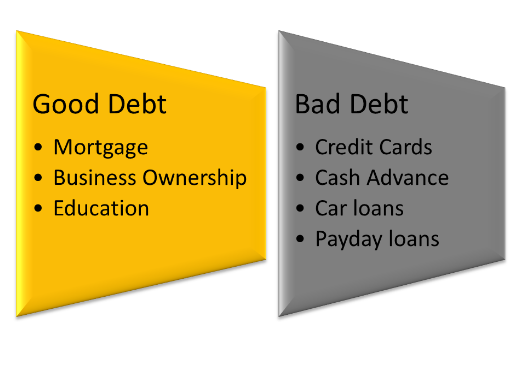
Debt is created when someone owes money to another person, organization, or entity and the person who owes the money is referred to as the debtor.
There are various forms of debt, and they can arise from different types of transactions. Here are some common examples:
Credit Card Debt: This occurs when individuals use credit cards to make purchases and then must repay the borrowed amount along with any accrued interest.
Student Loans: Many people take out loans to fund their education, and these loans must be repaid over time, often with interest.
Mortgages: When individuals buy homes, they often take out loans known as mortgages. The home serves as collateral, and borrowers repay the loan over an extended period.
Auto Loans: Like mortgages, auto loans involve borrowing money to purchase a vehicle, with the vehicle itself often serving as collateral.
Personal Loans: Individuals may borrow money for various purposes, such as debt consolidation, home improvement, or emergency expenses, through personal loans that are repaid in instalments.
Debt typically comes with the expectation that it will be repaid over a specified period, and interest may be charged on the amount borrowed. The terms of repayment, including interest rates and the repayment schedule, vary depending on the type of debt and the agreement between the borrower and the lender.
Getting out of debt is important for several reasons, as it can have a significant impact on your financial well-being and overall quality of life. Here are some compelling reasons why it’s crucial to work towards becoming debt-free:
Financial Freedom: Being debt-free means you have more control over your money. You can use your income for your priorities rather than servicing debt. This financial freedom allows you to save, invest, and spend on things that matter to you.
Reduced Stress: Debt can be a significant source of stress and anxiety. Constantly worrying about making payments, interest rates, and debt collectors can negatively affect your mental and emotional well-being. Eliminating debt can lead to a more peaceful and stress-free life.
Save Money on Interest: When you’re in debt, you’re not just repaying the principal amount; you’re also paying interest. The longer you carry debt, the more you end up paying in interest. By becoming debt-free, you save money that you can use for other financial goals.
Improved Credit Score: A high level of debt relative to your available credit can negatively impact your credit score. A better credit score can lead to lower interest rates on future loans, better insurance rates, and even improved job prospects in some cases.
Increased Financial Security: Without the burden of debt, you are better equipped to handle unexpected expenses or emergencies. Having savings instead of debt provides a financial safety net, giving you greater security in the face of life’s uncertainties.
Better Opportunities: Being debt-free opens opportunities that might be challenging with significant financial obligations. Whether it’s pursuing a new job, starting a business, or making a major life change, having financial flexibility allows you to seize opportunities as they arise.
Quality of Life: Living with debt can limit your choices and affect your lifestyle. Without the constant pressure of debt, you have the freedom to make choices that align with your values and contribute to a higher quality of life.
Retirement Planning: Planning for retirement becomes much easier when you’re not burdened by debt. Being debt-free allows you to focus on building a robust retirement fund, ensuring a more comfortable and secure future.
We help you take your personal finance to the next level. We educate you on managing debt responsibly to avoid financial difficulties and how you should strive to balance your borrowing with your ability to repay. Developing a plan to pay off debt and managing your finances responsibly are crucial steps toward achieving these goals. Getting out of debt is not just about financial health; it’s about improving your overall well-being, reducing stress, and creating a more secure and fulfilling future.
